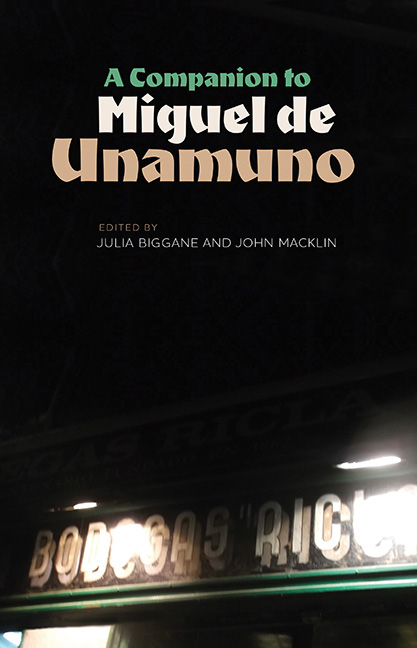Introduction
Published online by Cambridge University Press: 21 May 2021
Summary
As a novelist, dramatist, essayist, poet and public intellectual, Miguel de Unamuno (1864–1936) is a towering figure in twentieth-century Spanish cultural and political life. He was a strikingly energetic and prolific writer, producing five novels, seven novellas, eleven plays, scores of short stories, dozens of essays – major and minor – many hundreds of poems, an extensive body of travel writing and several memoirs. He also wrote a vast quantity of articles on diverse subjects for a wide range of newspapers and journals in Spain, wider Europe and Latin America. Widely recognised and translated during his lifetime, he was an inescapably canonical figure on university syllabi across Europe and the Americas for many years after his death, and still appears on many curricula, though his work may be framed rather differently. He still makes occasional appearances in contemporary Hispanic literature, sometimes in unexpected places – Roberto Bolaño's short story ‘Una aventura literaria’, (Bolaño 1997: 54) for example, or, less surprisingly, in Jon Juaristi's 2007 novel La caza salvaje.
Unamuno's literary fame rests principally on his novels, novellas and later drama. Unsurprisingly, the thematic and stylistic emphases of his prose fiction changed significantly over the course of an almost fifty-year writing career: the realism and preoccupation with national history in his first novel Paz en la guerra (1897) gave way to playful anti-realism and subversion of the conventional third-person narrator in subsequent novels such as Amor y pedagogía (1902) and Niebla (1914), and then to sober character studies such as Abel Sánchez (1917), La tía Tula (1921) and San Manuel Bueno, mártir (1930). Nevertheless, after Paz en la guerra, there are important continuities across his fiction: his characters are lonely, alienated or conflicted figures, assailed by profound doubts about the nature and purpose of their existence; they all hunger after some form of immortality and are anxious to leave a lasting mark – reproduction (whether spiritual or biological) is a major concern. His characters perceive themselves as vulnerable to destruction or annihilating absorption by a threatening ‘other’ – be that the author-figure himself in Niebla, an envied rival in Abel Sánchez, or even a much-loved figure in San Manuel Bueno, mártir and La tía Tula.
- Type
- Chapter
- Information
- A Companion to Miguel de Unamuno , pp. 1 - 4Publisher: Boydell & BrewerPrint publication year: 2016



